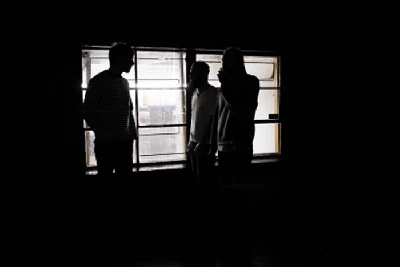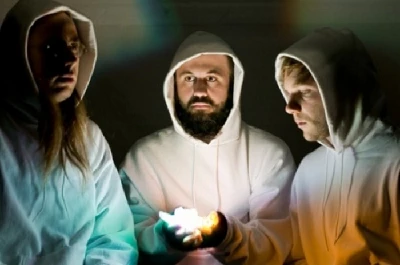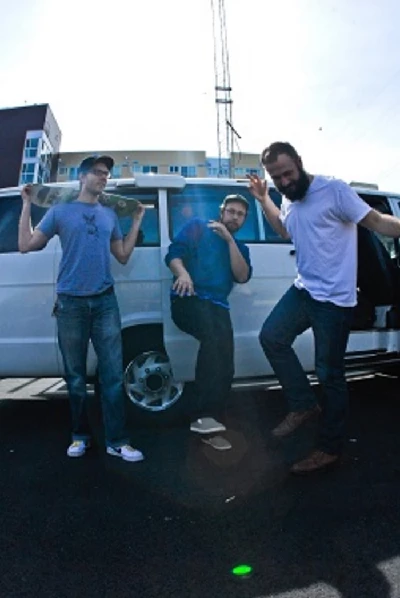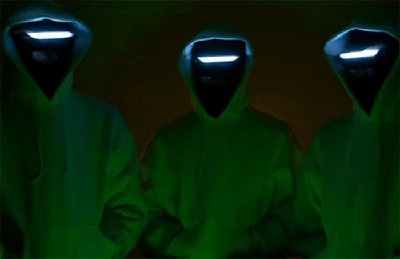published: 26 /
6 /
2011
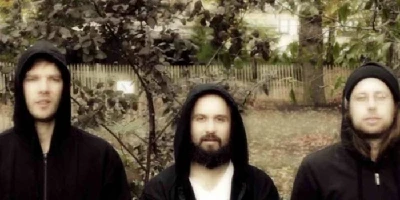
Jamie Rowland speaks to Seth Olinsky from psychedelic folk act Akron/Family, about his group’s Japanese-influenced seventh album, ‘S/T II: The Cosmic Birth and Journey of Shinju TNT’, and the video films that have been created to accompany each of the tracks on the new album.
Article
Akron/Family are a three-piece psychedelic, folk- rock, experimental, alt-pop band who are difficult to describe succinctly. Over the course of nearly a decade together, they have released six studio albums, countless self-released recordings and toured extensively around the world. Always impressively adept musicians, their sound and writing has matured and become more cohesive in the last few years, with their albums going from collections of songs written by different members of the band, to records with a more tangible arc, and compositions which feel more like collaborative pieces.
Earlier this year, they released their sixth album, ‘S/T II: The Cosmic Birth and Journey of Shinju TNT’, which is without a doubt the most exciting and original album to have come out this year (although it’s been criminally under-publicised, in my opinion!) The band – comprising of Dana Janssen (drums/vocals), Seth Olinsky (guitar/vocals) and Miles Seaton (bass/vocals) – then embarked on a European tour, which climaxed with a show at London’s fabulous Bush Hall at the end of May. I met up with Seth there to discuss the influence of Japan on the new record, the ever-reverberating influence of the Beatles on the music industry and the strains of being in a touring band. As I mention to Seth at the start of our chat in a rain-soaked London, he should have skipped the rest of Europe and come straight to the UK while the sun was still out...
SO: Yeah, it would have been better if it was a nice day, but...
PB: Oh, well. I suppose if you’re in a dingy venue anyway that it doesn’t make much difference
SO: Yeah. At least the venue’s only partly dingy; I mean the carpets are dingy, but the chandeliers are cool! But it is dark. Venues are always dark. I think we’ve only ever played one or two venues, in our entire history of being in a band, which had windows.
PB: I think that might be kind of weird; I don’t think I’ve ever seen a band anywhere that’s had windows.
SO: I don’t know why; is it that musicians melt?
PB: Maybe people would feel a bit self-conscious watching music when people can look in on them.
SO: People in general feel self-conscious. It happens a lot with our shows. I think most – for lack of a better word – “entertainment experiences” that people go to, they expect more of a one way street; you know, going to a movie or seeing a band play or whatever. It’s like they’re going just to consume this product: “I like this product, “Akron/Family” or this product “Led Zeppelin” or whatever; and then they go to the show and they forget about themselves and consume the thing, you know?
It’s just funny that you bring up the idea about people not liking windows because they’d feel self-conscious, because we are always looking for ways to make it feel a little more like the person is involved. Not just because we want them to clap along or sing along. It’s more of a value of trying to create a space where we’re all in the room together, and participating or celebrating in some kind of similar spirit.
It’s surprisingly an uphill battle to get people to feel or be a little less rigid, and be aware of themselves, and also be a little more loose and a little more open. I mean I guess I sort of feel that people want it deep down too. But there are a lot of layers they have to get through. It’s not something our society supports. I think when you look back on something like a Minor Threat concert, and the band is on the floor and the audience is singing along – it’s like one organism, you know? Or I just watched the movie on Pete Seeger, and there’s this one image that sticks with me – I think it’s the beginning of the movie – it’s just him, singing in a big seated hall with probably a thousand people, and he has his acoustic guitar and he’s just demanding, “Sing along! Sing louder!”
It brings tears to your eyes; it’s just so beautiful to hear that many people sing together and do this thing at the same time, and it’s really not about “Pete Seeger: The Folk Star”, it’s just about him being in this place, and he really believed that the simple act of singing along and being in the same space together can change the world. I do think that the experience of feeling a little less self-conscious and feeling a little more aware of yourself and the people around you, and going through that door and feeling all those joys and emotions with people - as opposed to like, at home with your TV, in a very less dynamic way – it’s pretty powerful.
PB: I think that’s true. There’s something about particular cities and the culture within them where it’s not really seen as the done thing to be expressive, or look...
SO: ...like you’re having a good time? It definitely happens. We played some shows in Italy that were in small towns, and the audience was much more mixed. There were little kids with soccer balls, and their grandparents and people walking their dogs, and then there were the kids who would maybe fit in more with like, you or me, who were more aware of different music and bands – but it was a very mixed crowd, and that crowd was much more there to have an experience with the music.
Then I think in urban centres, like London or Berlin, or New York City, or Chicago, people are so aware. Self-awareness fuels self-consciousness and our society is so aware of the hyper-detail of the difference between this band and that band, and this band’s CD and their last CD, and the EP and what point rating this thing got – and people are so aware of all these different factors, I think it becomes a really intellectual experience, and it’s hard.
I’ll admit, I find it hard myself to have an experience beyond that intellectual, self-aware experience, beyond a self-conscious experience. It takes energy; it takes more work than people on average can muster. The great thing about being in an urban centre is that there’s all this cool art and culture going on, and you can get educated about all the things that are going on, but it also creates this kind of elitist aesthetic-over-awareness, that can kind of hamper those things.
PB: But people obviously enjoy letting go, because that’s the main reason people go out on a Friday and Saturday night and drink copious amounts of alcohol – to lose themselves and forget about how they might look to other people, and just let themselves go.
SO: Definitely. I don’t actually drink that much, but I definitely see that people are looking for some way to break down that barrier a little bit – and I think that’s probably why people come to music too, in general. Music’s a pretty magical thing. Remove the internet and all that over-complicated stuff about music, and it goes back thousands and thousands of years, and it is pretty magical; the way it can tell stories, or convey emotions. This abstract thing, that you can’t even see – it’s in the air, but you can’t see it; it’s not like a painting. It can really convey a lot of deep stories, emotions, feelings, the mental, the physical, the spirit.
And I think even if people wouldn’t necessarily say it, for me I feel like people love music and want to come to music because they want some kind of feeling or experience that makes them feel a little high, you know? Makes them feel a little outside of themselves or puts them in touch with something a little deeper than their everyday thing. It’s just whether people are open to that side of it.
PB: I suppose it’s that strong emotional response music provokes that makes some people get so angry and vitriolic about it. It’s the same with films or...stand-up comedians even! If someone says. “Ph, there’s this hilarious stand-up, you should really go and see them,” and then you do and you don’t laugh...you see it on the internet all the time; apparently it’s just full of angry people saying, “Fuck this guy, he sucks and anyone who likes him is a dick!” And then the argument goes on for about 70 posts underneath that.
SO: Message board culture is a little weird; anonymous postings and things. I find even with email too, people use the distance of the internet to be able to vent frustration. I think people say things in email all the time that I don’t think they would ever say to a person directly. To me, I think it just ends up clouding a lot of communication and creating a lot of cultural distance. I mean I’m not 100% anti-internet; I think there’s a lot of positive things and I totally recognise that a band like ours would get to tour round the world and meet people who say “I’ve heard your music!”, which is incredible and beautiful, and we definitely have the intention of wanting to share our music with people – but at the same time the internet does end up separating things and allowing people to “de-communicate”.
PB: I think that’s very evident on a site like YouTube, where it doesn’t matter what video you watch or what it’s about, that there will always be a flowing stream of abusive comments and arguments going on underneath.
SO: Well it’s funny; the artwork we did for our new record... we did five or six different versions of [S/T II], we call them “bombs”; these bombed-out versions. It was sort of a reference to back in the days of Napster, there was this group of people who did these Napster “time-bombs”, where whatever was popular that week – Bruce Springsteen, or whatever – they would put weird sounds, crazy music or their friends music or whatever into Bruce Springsteen songs, ZIP it up and put it on, and people would download it and not know, and that was this “time bomb” thing that they did as a prank.
So we didn’t let the label send out our record, and we just leaked these onto the internet but with the correct title, and no one knew. They thought it was just that the record got leaked. The message boards were like, “This is amazing!” and someone else would write, “This fucking sucks, I hate them!”, and another person would put “I can’t believe you’re such an idiot, it’s obvious this is fake” and then “No, they’ve taken a new direction!” It became this heated argument; the whole thing played itself out and it was pretty funny.
But the artwork we made, we printed off all the message boards and cut them up, pasted them all over; it looks pretty funny. For us, we were just having fun with the way that things work, and it just ended up being a fun way to interact with that natural tendency of the way that things work now, and the way that music leaks, people talk about it and then they judge it and the whole process is so funny. So it was fun to prank with that a little bit. And actually, the music’s really cool; we used the songs on the album as source material, but it’s these really extreme sides of the songs. When we’re making music, we always have a lot of ideas, and we put it into a song and it comes down to being finished and being “a thing”, but there’s all these more extreme parts of those ideas that, as it gets pushed towards being one thing, they just...
There’s a potential at the beginning of a song, when it’s just an idea, and then you write it and you present it to the guys and you work on it – and every step of the way, it could be a thousand things, but now we’re limiting down to five hundred, then less. It’s almost like you limit it, limit it and limit it until it’s just the one thing; you make the decision as an artist to make it that one thing. But there’s always a sadness too, looking back at the point when it was a rough mix, because you hear that rough mix with the magic of it maybe going fourteen different directions.
Sometimes what’s fun about playing it live is you can take a song in a number of different directions. The hard thing about recording a record for us is that limitation, so it was fun to get to be careless and free and extreme, and slow it down four octaves and make it so different. But it’s still the same song, and there’s still some of that harmony, melody and emotion, but it’s like if you could shoot a movie from all the different characters’ points of view to tell the same story all these different ways. It was a really fun project.
PB: It’s interesting to see, as internet and download culture becomes so much a part of everyday life, how different artists and labels react to it. Major labels seem to use a more attack-is-the-best-form-of-defence method, whereas smaller labels and individual artists seem to try to embrace it a bit more, or at least come to some kind of compromise.
SO: Well for us, we just thought well, this is the way things are – how can it be part of the artistic process, or how can it be fun for us; as opposed to disappointment, like “Oh, our album leaked” or whatever. There are people that fight it and there are people that go with it.
PB: Fighting it seems like a bit of a losing battle...
SO: Yeah, obviously; I mean there’s just so much momentum. Like I said before, if the ability to trade music free didn’t exist, a band like ours – a band like all these bands – wouldn’t exist the way they do, you know? There’s not enough money to support people having that much music, but because it’s freely traded now, it just means that people can be aware of so many things.
The hard thing though, artistically, is that there’s so much information it just kind of fills up and becomes static, and I feel like culture’s going in this direction where if someone’s downloaded your band, they’ve listened to your band, you know? I think there’s less and less space for people to really listen. I’m sure millions of people have made this statement, but there’s this sense that, when you were a kid, and you’d save up and buy one record that week – and even if you don’t get it at first, you just spent your money on it, and you’re going to try to find ways into it, you’ll come back to it. A lot of my favourite records are records that I didn’t like the first time; they challenged me in some way, or I didn’t respond or I didn’t get why the artist was doing that. But then I went back and the record slowly would come to life, and then it would feel like an authentic experience, you know what I mean? Growing with something.
Music can be very immaterial now, and I think it’s very collector-ish, and alphabetised on your iPod. It’s a different thing, it’s a different world; it’s more of a huge blur of music and information – in that sense, it’s pretty psychedelic, I think, this onslaught of information. There’s no way, really, to be that organised or be able to process it all; there’s always going to be more than you can actually really handle. And there’s something cool to be said about that, but for us as artists, as we try to seek out people who we can try to make more of a lasting connection with, sometimes it can feel a little hard to do that.
PB: Is it right that you recorded some of your new album ‘S/T II: The Cosmic Birth and Journey of Shinju TNT’ in Japan?
SO: No, it was more of a time of inspiration; we didn’t record anything. I was just writing. I think just naturally all of us are always changing and wanting to grow and go in different directions, and the way we have things set up as a band is that the recording process tends to be more of a time of experimentation, and trying new ideas, looking for new sources of inspiration. Then we get to go out on the road and kind of explore that a little more live, but this time around we had just become really inspired when we played in Japan on tour.
There are all these musicians there and this real focused commitment to their expression that we felt was unique and a little different from... it felt less self-conscious, to go back to that for a moment; it feels like a lot of people our age that we’d seen in America or over here, those musicians performed with a certain level of self-consciousness, or they were very aware of what they looked like or sounded like. They were trying to present something and they were trying to look a certain way, or be perceived a certain way on some level.
When we were over there, it just felt like there was a commitment to a raw expression, almost like there was something in these performers that needed to be expressed, and it didn’t matter what they looked like or if they looked insane or awful or sounded bad; it was like a commitment to this pure expression, and it felt really powerful, artistically powerful. I think we all were just blown away, and the shows we played over there, we were inspired by this kind of wildness and commitment, and it inspired our trajectory for new music, so I think that that was why we did that there. But we went to Detroit actually, to record.
PB: Looking back over your discography, aside from the 6 studio albums you’ve released, there are a number of self-released EPs and tour albums that you’ve produced over the years, including a 3 CD set of your own solo recordings (‘Best of Seth’). On top of that, you seem to be on tour all the time...
SO: Yeah, tell me about it!
PB: Do you ever actually have any time to just chill out and do nothing that relates in any way to music?
SO: [Laughs] Yeah, I actually have recently been trying to make more time for myself that way, because we and I definitely tend to like, when I have time I just always have ideas and I’ve been making those ideas musical for so long that I always have musical ideas, and I’m just fascinated with new things and sometimes I don’t give myself a break. But before this tour actually, my girlfriend and I went to Hawaii and we started learning how to surf. It was great. We went and we would wake up with the sun and surf, and then be exhausted and go to bed with the sun. It was very simple, and I really didn’t have any internet or anything; it was just three weeks of camping on the beach and surfing. It was very natural, and very much needed rest and respite.
It’s something that I’ve been thinking about more maybe too, is taking care of myself as an artist. There’s just so many things that you want to do, and then like the more people you meet, the more opportunities you have to play with this musician or play over here, do this thing... it’s really fun and inspiring, but at a certain point there’s just so much output, you forget a little bit about input and about yourself, and it’s important to be able to take care of yourself. Whether it’s space, or just making time to read a book, or making time for your friends and family and all that stuff I think really is pretty nourishing to the creative process, and sometimes when you get into a point when you’re making too much stuff too quickly, the stuff can start to feel a little anaemic artistically.
It’s true too; stepping out you start to realise that “Oh wow, there’s all these things in life I want t explore!” You know, I want to become a really good ping-pong player, or I want to learn how to paint. I think all those things too, if you’re just working all the time, and you have your hyper-focus goggles on you can lose track of some of that stuff, and that stuff all helps to make the artwork that you are trying to make feel more real.
PB: I noticed that you’ve been releasing music videos for tracks on the new album. You’ve not really been a music video band in the past, so what inspired you to try them out this time?
SO: Yeah, we made around eight, and four are out so far. We’ve never done it before. With this album, we didn’t have very much of a budget, but through screwing around with the last record I had met a lot of people who did cool stuff, and collected names. So I split up the little budget, and I said, “Hey, I know there’s not much money, but is there something creative you guys can all do, and then we can make eight or ten videos.” We didn’t quite make a video for every song. It wasn’t highly conceptual. It was just like, let’s try and work with all these different people and see what comes up.
For me, it’s a learning process; it’s such a different medium, and it’s so powerful when you combine the visual with sound you know? Each director’s style and take is so different, so it’s been a really cool learning process – that’s how I viewed it; learning how to communicate with directors, and share ideas and see what comes out of it. It’s been pretty cool.
PB: Were you in discussion with the directors about ideas, or did you just say, “Here’s a song to work on – listen to it and see what you can come up with”?
SO: The way we approached it was that we threw some aesthetic ideas or little themes or whatever at everyone; the same stuff, and we just said, “Here’s some things that we like visually or relate to or are inspired by. You don’t have to put any of this in the video, but we’re just giving this to everyone so maybe there’ll be some little threads that run through it.” And then it was pretty much just let them go. Some people we had a little bit more dialogue with, some people just kind of said, “I’m just gonna run with this,” which was cool. It was great. It was a really cool experience. I think through this process if we ever wanted to make a more high-budget video or an official video, learning the process of it has been really fruitful.
It was nice because our music has so many sides to it, I think if we had to make just one video it would feel hard to find the right style, so that was another idea too. Like the video for ‘Island’ is this really hi-fi video with helicopter shots, and ‘So It Goes’ is this goofy video on Google. Our friend made one for ‘Light Emerges’ shot on film, and it’s a little more abstract and feels more artistic. I feel like all of them together kind of add up to telling more of a story for us.
PB: Your sound is very hard to pin down; it’s not like there is a definitive Akron/Family sound, which I would consider to be a good ad interesting thing.
SO: Yeah, definitely. I think we’re always exploring and changing and, as we grow up with each other and learn more about what we do, we’re learning to make some more decisions and be like we want to focus here now. It’s not like saying “This is what we are.” It’s just this is what we are now. Something that we’ve been coming to see recently is that sometimes we’re just trying to cram all of our ideas into one place all at once and it can feel a little foggy. We’ve been trying to space it out in different ways, and say, “This time we’re going to go here and do this” or “we’ll go here and do that”.
It’s been six or seven years of doing everything all the time, and it gets very dense for people I think and it’s hard for people...unless they have a lot of experience with it, or come to the table with a lot of background information of the story, it gets to be like a really dense, post-modern fiction work where you really have to chew every paragraph to find all the reference points put the whole thing to together.
For some people I think that’s a really rich experience, musically. They come, and are feeling all the different reference points and are really paying attention sometimes, or can open up and be silly other times, and all these different things are happening and swirling around like a very rich emotional and intellectual experience. But for other people, if they’re not really there with all that focus, I think it can be hard to get in through the door to it.
PB: What was the first album you ever bought/owned?
OS: I remember I had New Edition on tape. That was the boy band Bobby Brown was in before going solo. The first CD I ever bought was ‘Sergeant Pepper’s’.
PB: Do you think the influence of those two albums still resonates in your work today?
OS: Hmm. Maybe not New Edition... I like soulful music but...Dana loves R’n’B. Really, he listens to a lot of R’n’B. He really loves it. I mean I can appreciate the production of it, but to me it’s just a little too clean. I like old R’n’B and soul music.
Definitely ‘Sergeant Pepper’s ‘has been influential on me in a lot of ways. I’m a big Beatles fan. All of us are. The Beatles, I think even besides musically, have been influential, and this idea –whether it’s positive or not – when you’re a kid and you want to start a band and there’s this idea of being the greatest band in the world, being this huge band. I think it’s a Beatles-esque cultural mentality, and I think as we’re growing up we’re realising well, maybe that’s kind of bullshit and we want to be something different and we want to be ourselves.
I think culture can often put you on a road and tells you it’s the right direction, and you buy into it without really thinking about it – I’m sure all sorts of different people do it all the time with all different sorts of different things – but with bands it’s like oh, we’ve got to sell more records or sell more tickets, or we’ve got to be on this thing, and I think that as we kind of mature as artists we’re realising that what’s really important to us is being more creative, and finding better ways to find our vision and communicate it with people. If that’s reflected in more people coming to hear it then that’s wonderful, but... in that sense, I think we’ve been working our way out of the Beatles mythology a little.
PB: Thank you.
Picture Gallery:-
